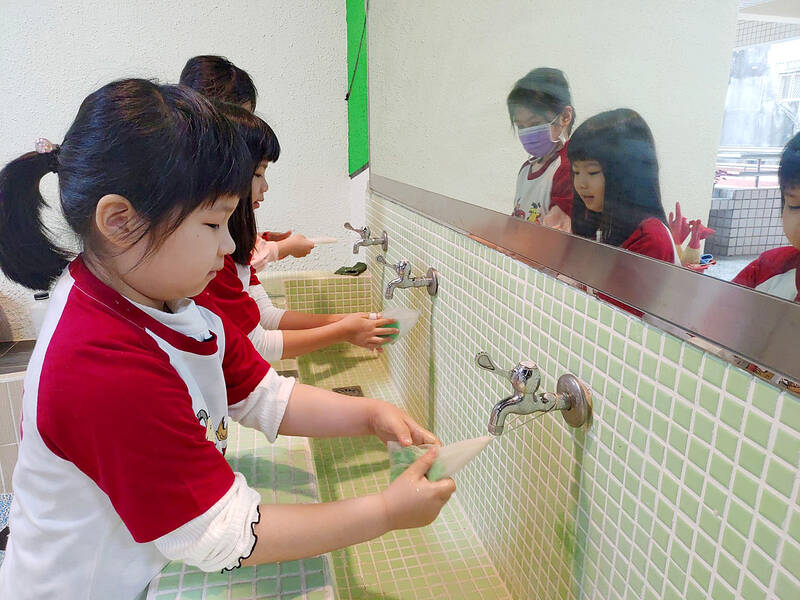Alcohol-based hand sanitizers do not protect against some pathogens, the Centers for Disease Control (CDC) said, urging people to wash their hands thoroughly and frequently.
Hospitals nationwide last week held public awareness campaigns on the importance of hand hygiene to celebrate World Hand Hygiene Day on Monday. The day is part of the WHO’s “Save Lives: Clean Your Hands” campaign launched in 2009.
Spraying alcohol on the hands, or wearing gloves or a mask are not enough to protect against some viruses, such as the highly infectious enteroviruses and norovirus, as they are quite resistant to alcohol, Cathay General Hospital Department of Internal Medicine deputy director Chen Li-chun (陳立?) said.

Photo: Huang Hsu-lei, Taipei Times
Washing hands with water and soap can eliminate more than 95 percent of bacteria and viruses on the hands, and it is more effective in preventing diseases than using alcohol-based hand sanitizers, he said.
People should especially wash their hands thoroughly before eating, after petting animals, returning home, using the bathroom, playing outside and blowing their nose, to protect themselves, as well as their family members and people nearby, Chen said.
People should also wash their hands thoroughly before and after wearing gloves, as studies have suggested that even medical personnel who wore gloves according to standard procedures might still have a 4.5 percent chance of developing a viral or bacterial contamination on their hands after removing their gloves, Cathay General Hospital superintendent Chien Chih-cheng (簡志誠) said.
In the post-COVID-19-pandemic era, many people are used to wearing a mask to protect against infectious diseases, but have not formed the habit of washing their hands frequently, National Taiwan University Hospital Center for Infection Control deputy director Wang Jen-tay (王振泰) said.
However, hand washing is important for preventing many diseases, as well as for reducing the use of antibiotics and the risk of antimicrobial resistance, he said.
Thoroughly washing hands is the easiest and most cost-effective way to prevent medical-care-related infections and antimicrobial resistance, Deputy Minister of Health and Welfare Chou Jih-haw (周志浩) said.
National Taiwan University vice president and Joint Commission of Taiwan chairman Chang Shan-chwen (張上淳) said medical personnel’s hands are often full of infectious pathogens, and they can easily spread bacteria or viruses if they forget to wash their hands thoroughly.
Even wearing gloves might not provide sufficient protection, he said.
Medical personnel, caregivers or workers in healthcare facilities should wash their hands thoroughly before approaching patients, before operating cleaning or disinfection procedures, after being exposed to body fluid, after close contact with patients and after being exposed to environments with patients, the CDC said.
Additional reporting by CNA

The manufacture of the remaining 28 M1A2T Abrams tanks Taiwan purchased from the US has recently been completed, and they are expected to be delivered within the next one to two months, a source said yesterday. The Ministry of National Defense is arranging cargo ships to transport the tanks to Taiwan as soon as possible, said the source, who is familiar with the matter. The estimated arrival time ranges from late this month to early next month, the source said. The 28 Abrams tanks make up the third and final batch of a total of 108 tanks, valued at about NT$40.5 billion

Two Taiwanese prosecutors were questioned by Chinese security personnel at their hotel during a trip to China’s Henan Province this month, the Mainland Affairs Council (MAC) said yesterday. The officers had personal information on the prosecutors, including “when they were assigned to their posts, their work locations and job titles,” MAC Deputy Minister and spokesman Liang Wen-chieh (梁文傑) said. On top of asking about their agencies and positions, the officers also questioned the prosecutors about the Cross-Strait Joint Crime-Fighting and Judicial Mutual Assistance Agreement, a pact that serves as the framework for Taiwan-China cooperation on combating crime and providing judicial assistance, Liang

A group from the Taiwanese Designers in Australia association yesterday represented Taiwan at the Midsumma Pride March in Melbourne. The march, held in the St. Kilda suburb, is the city’s largest LGBTQIA+ parade and the flagship event of the annual Midsumma Festival. It attracted more than 45,000 spectators who supported the 400 groups and 10,000 marchers that participated this year, the association said. Taiwanese Designers said they organized a team to march for Taiwan this year, joining politicians, government agencies, professionals and community organizations in showing support for LGBTQIA+ people and diverse communities. As the first country in Asia to legalize same-sex

MOTIVES QUESTIONED The PLA considers Xi’s policies toward Taiwan to be driven by personal considerations rather than military assessment, the Epoch Times reports Chinese President Xi Jinping’s (習近平) latest purge of the Chinese People’s Liberation Army (PLA) leadership might have been prompted by the military’s opposition to plans of invading Taiwan, the Epoch Times said. The Chinese military opposes waging war against Taiwan by a large consensus, putting it at odds with Xi’s vision, the Falun Gong-affiliated daily said in a report on Thursday, citing anonymous sources with insight into the PLA’s inner workings. The opposition is not the opinion of a few generals, but a widely shared view among the PLA cadre, the Epoch Times cited them as saying. “Chinese forces know full well that